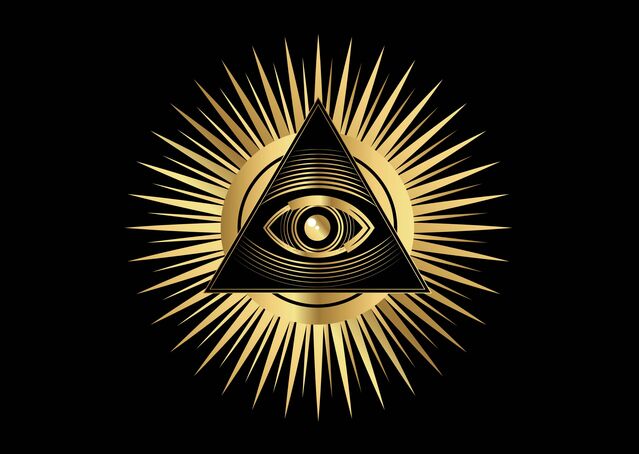Spirituality
Spirituality, Wellness, and Conspiracy Beliefs
Their commonalities may not be self-evident but are not really surprising.
Posted September 29, 2022 Reviewed by Vanessa Lancaster
Key points
- Spirituality, wellness, and conspiracy theories offer an illusion of control, special knowledge, and understanding of the world.
- It’s easy to overestimate one’s understanding of complex topics. Science and critical thinking are harder than they seem.
- People who over-rely on intuition or gut feelings are more likely to believe in conspiracy theories, alternative medicine, and supernaturalism.

One community in particular has found itself prey to QAnon: the yoga, wellness, and spirituality world, where skepticism about vaccines has intersected with the rapid spread of disinformation online to create a toxic stew known as "conspirituality."– WNYC’s On the Media1
New Age people tend to put a massive emphasis on their intuition, on what feels true and what resonates.– Jules Evans, Writer, Academic Historian, and Spiritual Seeker2
Beautiful, caring people were suddenly saying that COVID isn’t real. –Melbourne yoga teacher, quoted in The Sydney Morning Herald3
New Age (or alternative spirituality), wellness culture, and conspiracy theories make strange bedfellows.
In 2011, Charlotte Ward and David Voas highlighted a surprising convergence between belief systems that we generally consider to be on opposite ends of the political spectrum. Spirituality, especially alternative spirituality or New Age, is predominantly thought of as attracting people who consider themselves on the political left and has generally been a female-dominated cultural phenomenon.4
On the other hand: we generally regard conspiracy beliefs as a far-right-wing (and predominantly male-dominated) phenomenon. The paper's authors coined the term “conspirituality” to refer to this unexpected confluence of conspiracy thinking and spirituality.5
The paper received renewed attention during the COVID-19 pandemic, as conspiracy theories fueled opposition to government-mandated restrictions and mass vaccination campaigns, and as that opposition became a serious threat to public health.
COVID-denialist conspiracy theories and protests against public health measures generally come from a predominantly right-wing demographic. Unsurprisingly, they have disproportionately attracted supporters among religious folk from conservative denominations. But more surprisingly, they have also disproportionately attracted people who self-identify as believers in New Age/alternative spirituality, and those who subscribe to wellness culture.
Belief in alternative spirituality often accompanies wellness culture, with adherents to both generally coming from a predominantly left-wing demographic, tending to subscribe to “holistic” notions of mind, body, and “spirit.”6
What Do They Have in Common?
Why would believers in spirituality, especially the “alternative” kind and wellness culture, be drawn to conspiracy theories?
All three belief systems attract individuals with a more intensely anxious need than most people to feel in control over their life and the complex and often random factors buffeting them. These beliefs provide the illusion of control and feelings of empowerment.
These belief systems are also attractive to people with a strong desire to feel knowledgeable and that they have special access to the unique knowledge of the world, about which ordinary people are ignorant. People with such beliefs often consider everyone else to be gullible (with no sense of irony in making that presumption).7
As noted in a Washington Post article:
Alternative spirituality and conspiracy are, in the end, united by a narcissistic idea: that there are things in the world crying out for explanation and that you alone are unraveling the truth.8
The ubiquitous availability of information on the internet leads people with little formal training in exceedingly complex fields of knowledge to confidently declare that they have “done my research.”
People attracted to all three belief systems tend to have difficulty understanding and accepting the central role of randomness and contingency in the world, tending to see patterns, causality, and intention where they do not exist.
Those prone to these beliefs tend to have personality traits of excessive “openness to experience and new ideas,” and proneness to magical thinking.
In particular, they tend to over-value and over-rely on intuition or gut feelings in forming their understanding of the world.
Intuitionists
Eric Oliver, a political science professor at the University of Chicago and an expert in conspiracy theories, and Thomas Wood, associate professor of political science at Ohio State University, have extensively studied and described how people prone to conspiracy theories, supernatural and paranormal beliefs, and beliefs in unscientific alternative medicine, have a strong tendency to utilize intuitive thinking over evidence-based thinking.
Content that seems and feels right more readily persuades people who rely mainly on intuition to understand the world.
For Intuitionists:
Reason alone is not a sufficient basis for making decisions; gut feelings, intuitions, and faith are. To the Intuitionist, truth is felt, not deduced. As a result, Intuitionists comprehend politics in a manner similar to how they understand God–through emotions, symbols, and metaphors.9
Oliver and Wood found that conservative religious Americans (mainly evangelical or orthodox communities) and people who believe in New Age/alternative spirituality tend to have very high intuitionism scores and receptivity to conspiracy theories.
Alternative Health Beliefs/Practices
They also found that people who believe in conspiracy theories, and those who subscribe to alternative spirituality beliefs, tend toward anti-vaccine beliefs and an array of other unscientific/antiscientific beliefs and practices about health and diet:
Millions of Americans are rejecting the evidence of well-established science in favor of ideas that have no empirical evidence.
Many not only remain skeptical of modern medicine but entertain all kinds of fantastical notions about their health and diet.
Millions more engaged in alternative health practices ranging from acupuncture to homeopathy. And still millions more bought organic or gluten-free foods.10
The higher a person’s Intuitionism score, the more likely that person will:11
- Believe in supernatural notions like angels, hidden Bible codes, or the power of prayer.
- Believe in paranormal ideas like reincarnation, ghosts, or ESP.
- Reject well-established scientific explanations or the advice of medical experts.
- Mistrust their fellow citizens, the media, and civic institutions.
- Be more easily swayed by emotional appeals and evocative symbols.
- Subscribe to conspiracy theories.
- Embrace populist characterizations of money, power, and politics.
- Hold strongly nationalistic and ethnocentric views.
- Endorse alternative medicine and the sanctity of natural foods.
- Be intolerant of basic democratic norms and civil liberties.
The Connectedness of All Things
The common underlying habit of thought and belief underlying conspiracy theories, spirituality, and many alternative health beliefs is a tendency to see connections between things that are random, coincidental, or merely correlational.
As articulated by Matthew Remski, a yoga teacher and journalist who has researched cultism in the modern yoga world and is a critical commentator on “the apparently paradoxical alliance" between right-wing conspiracy thinking and wellness communities:
People who are interested in yoga, alternative health and wellness […] tend to share a number of interests and commitments. Three of them might be the notion that everything is connected, nothing is as it seems and everything happens for a reason […] This can be axiomatic to eastern spirituality for example—but they also happen to be the principles by which conspiratorial thinking drives itself.12
Ward and Voas had similarly found that beliefs that nothing happens by accident, nothing is as it seems, and everything is connected are fundamental to most conspiracy theories and New Age/alternative spirituality, or the phenomenon they referred to as conspirituality.13, 14
The Default Mode of Thinking
Beliefs contradicted by evidence are the norm, not the exception. Most people incline toward spiritual belief. This is normal. Over-riding this inclination with scientific thinking doesn’t come easily and is often counterintuitive. In many ways, the intuitive style of thinking—and in particular, the intuition that everything happens for a reason—is the natural, default mode of thinking for humans. From an evolutionary psychology perspective, it’s a by-product of more adaptive ways of thinking that aid survival, as I explained in a previous post.15
The True Value of Intuition
Intuitiveness underlies emotional perceptiveness, social skills, and many practical and professional skills. Intuition honed by experience and training can be especially valuable—for example, the diagnostic intuitions of an experienced clinician, or the intuitions of a scientist generating hypotheses.
But there is a danger of overconfidence by the person who possesses that level of intuition and a risk that they may find it even harder to recognize when their instincts are off-base and leading them down an erroneous path of assumptions.
Science Is Hard
When it comes to testing a scientific hypothesis's validity and predictive accuracy, there is no substitute for objective data gathered meticulously through rigorously designed studies controlling for confounding variables.
Even then, to be able to have greater confidence in the findings, they must be replicated by independent scientists and critically reviewed by experienced peers who will pick apart methodological flaws and identify cognitive biases and faulty assumptions in the original research.
That kind of critical review is what “I’ve done my research” should entail. Science is a painstaking, time-consuming collective effort that requires considerable expertise. Importantly, it also involves a willingness—indeed an eagerness—to disprove one’s beliefs and assumptions if that’s where the data lead.
Similarly rigorous approaches apply to studying the complexities of political science, economics, and history.
Science and critical thinking are harder than they seem. It’s easy to overestimate one’s understanding of complex topics.
References
1. WNYC’s On the Media, “The Rise of ‘Conspirituality,’" September 25, 2020, https://www.wnycstudios.org/podcasts/otm/segments/rise-conspirituality-on-the-media.
2. Jules Evans, "Conspirituality 2022," Medium, August 26, 2022, https://julesevans.medium.com/conspirituality-2022-9c13eb0f45ab.
3. Sophie Aubrey, "'Playing with fire': The curious marriage of QAnon and wellness," Sydney Morning Herald, September 27, 2020, https://www.smh.com.au/lifestyle/health-and-wellness/playing-with-fire-the-curious-marriage-of-qanon-and-wellness-20200924-p55yu7.html.
[Click 'More' to view footnotes 4-15].
4. Closely related to alternative spirituality is the wellness movement, which the authors of the 2011 paper hinted at but did not delve into. The link between these two belief systems / cultures has been extensively written about in subsequent research. Both are characterized by high degrees of openness to alternative beliefs, and see themselves as focused on self-improvement.
5. Charlotte Ward & Prof. David Voas (2011) The Emergence of Conspirituality, Journal of Contemporary Religion, 26:1, 103-121, DOI: 10.1080/13537903.2011.539846.
6. Predominantly left-wing at least in contemporary American society, and for the most part. But see https://gen.medium.com/nazi-hippies-when-the-new-age-and-far-right-overlap-d1a6ddcd7be4.
7. Cichocka, A., Marchlewska, M., & Biddlestone, M. (2022). Why do narcissists find conspiracy theories so appealing?. Current opinion in psychology, 47, 101386. Advance online publication. https://doi.org/10.1016/j.copsyc.2022.101386.
8. Marisa Meltzer, “QAnon’s Unexpected Roots in New Age Spirituality,” The Washington Post Magazine, March 29, 2021, https://www.washingtonpost.com/magazine/2021/03/29/qanon-new-age-spirituality/.
9. Eric Oliver and Thomas Wood, Enchanted America (Chicago, IL: University of Chicago Press, 2018), p. 106.
10. Oliver and Wood, Enchanted America, p. 149.
11. Oliver and Wood, Enchanted America, p. xiii.
12. Alex McKeen, "The rise of ‘conspirituality’: When ‘spiritual’ people embrace conspiracy theories, it can spell trouble," The Toronto Star, February 27, 2021, https://www.thestar.com/news/insight/2021/02/27/the-rise-of-conspirituality-when-spiritual-people-embrace-conspiracy-theories-it-can-spell-trouble.html.
13. Ward and Voas, "The Emergence of Conspirituality."
14. Some influencers in the wellness community have pushed back against the spread of conspiracy theories in that community: e.g.
https://conspirituality.buzzsprout.com/1875696
https://julesevans.medium.com/conspirituality-2022-9c13eb0f45ab
15. And in more depth in Finding Purpose in a Godless World: Why We Care Even If the Universe Doesn't.




